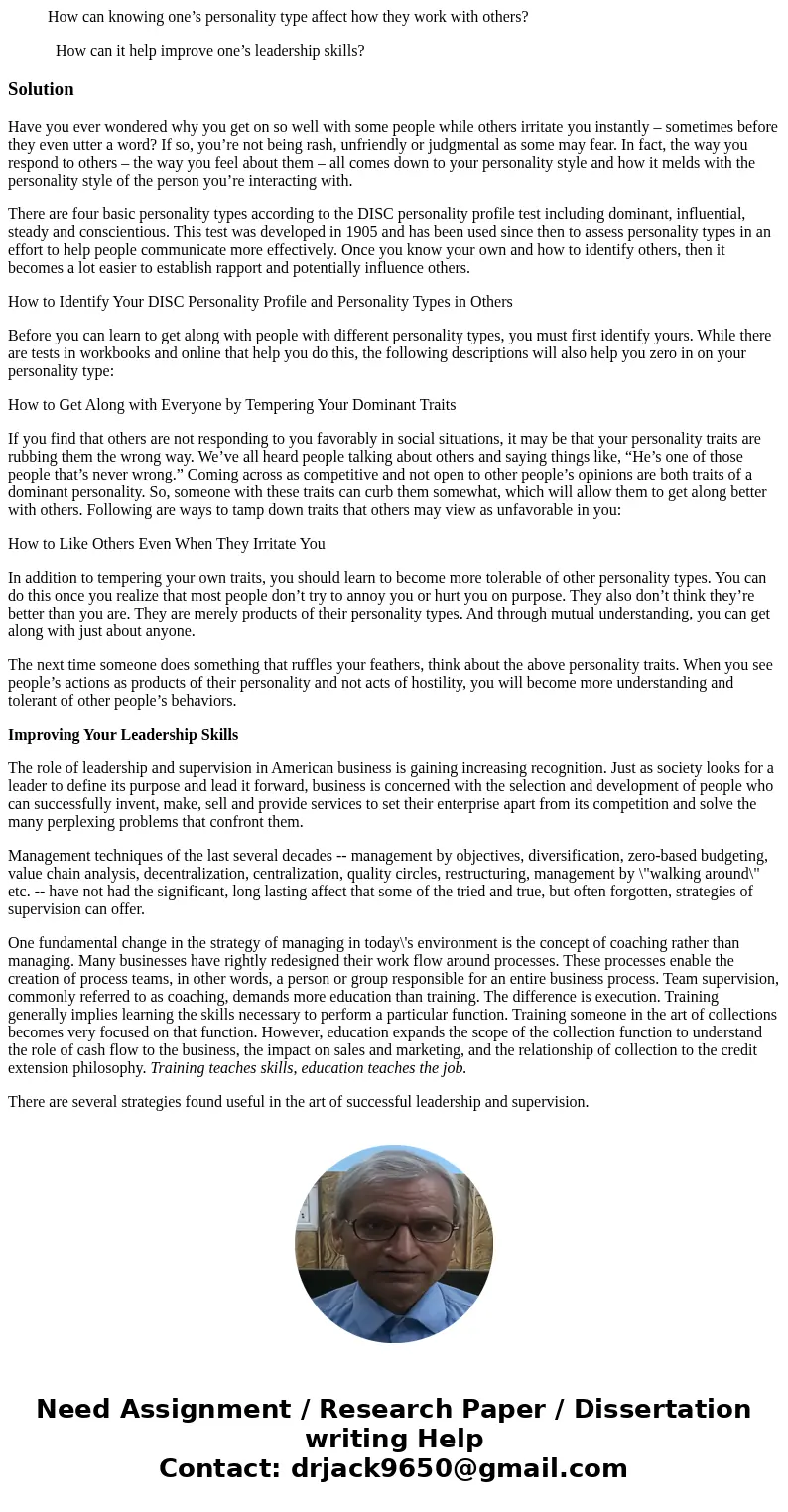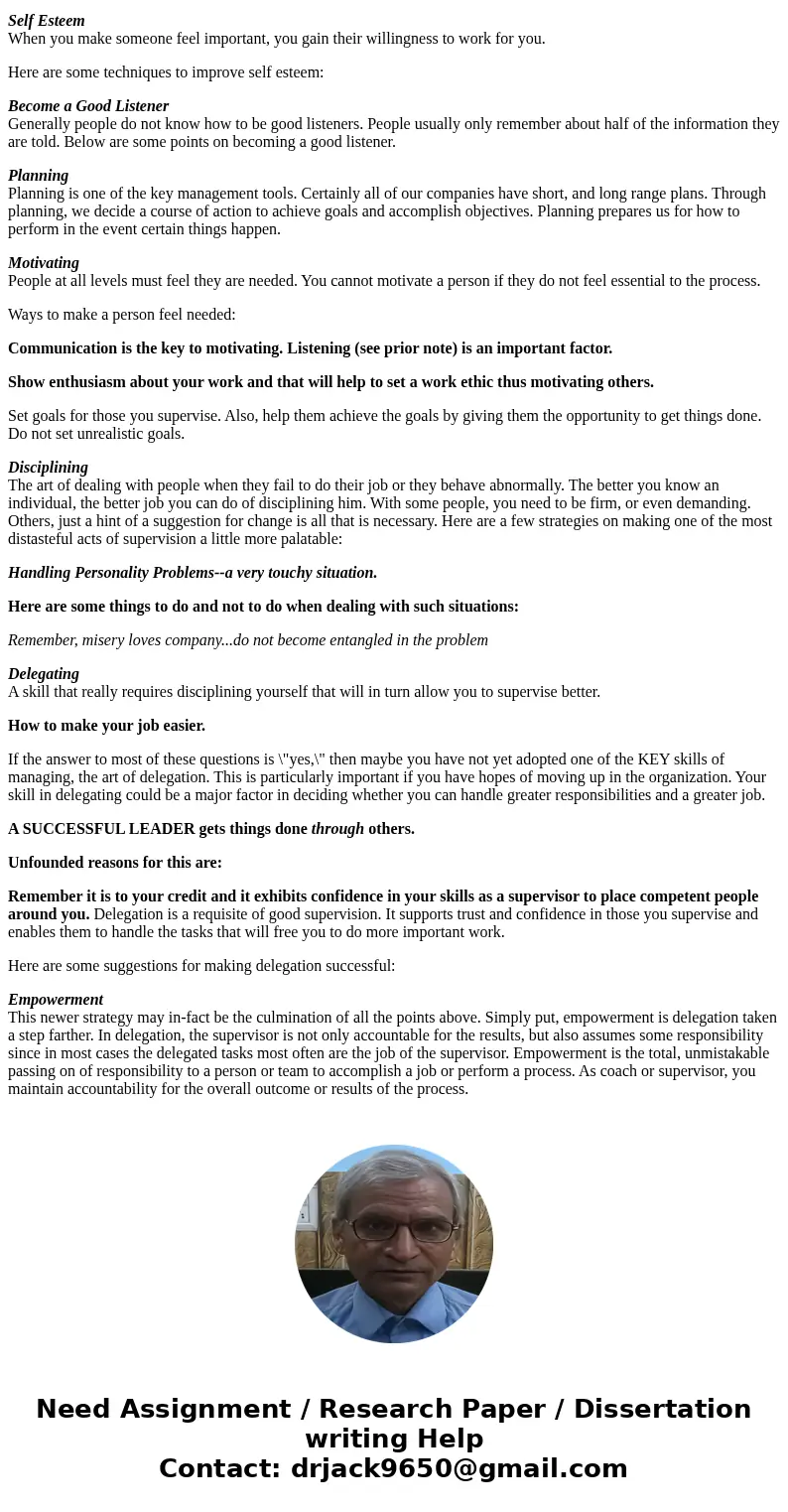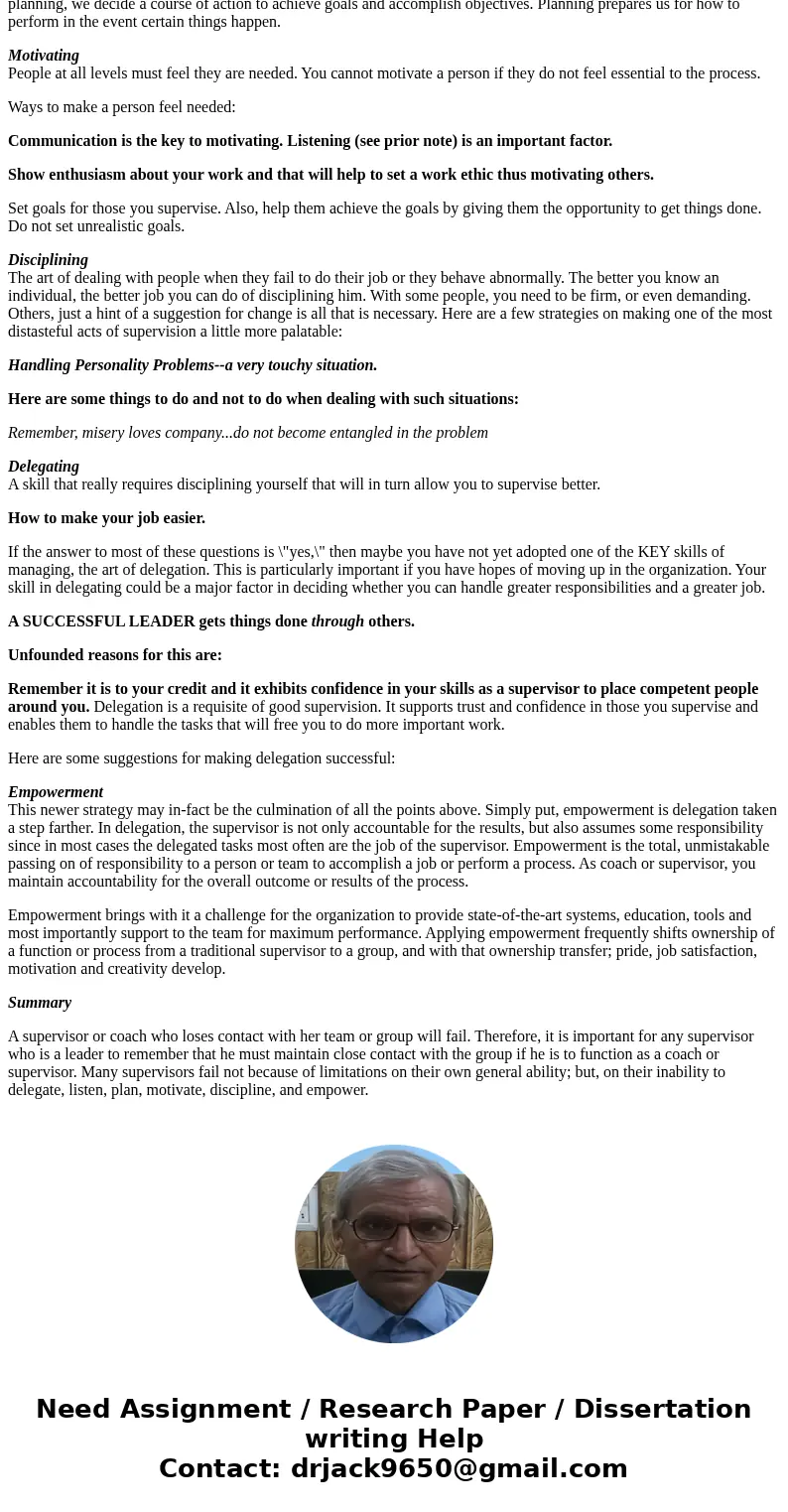How can knowing ones personality type affect how they work w
How can knowing one’s personality type affect how they work with others?
How can it help improve one’s leadership skills?
Solution
Have you ever wondered why you get on so well with some people while others irritate you instantly – sometimes before they even utter a word? If so, you’re not being rash, unfriendly or judgmental as some may fear. In fact, the way you respond to others – the way you feel about them – all comes down to your personality style and how it melds with the personality style of the person you’re interacting with.
There are four basic personality types according to the DISC personality profile test including dominant, influential, steady and conscientious. This test was developed in 1905 and has been used since then to assess personality types in an effort to help people communicate more effectively. Once you know your own and how to identify others, then it becomes a lot easier to establish rapport and potentially influence others.
How to Identify Your DISC Personality Profile and Personality Types in Others
Before you can learn to get along with people with different personality types, you must first identify yours. While there are tests in workbooks and online that help you do this, the following descriptions will also help you zero in on your personality type:
How to Get Along with Everyone by Tempering Your Dominant Traits
If you find that others are not responding to you favorably in social situations, it may be that your personality traits are rubbing them the wrong way. We’ve all heard people talking about others and saying things like, “He’s one of those people that’s never wrong.” Coming across as competitive and not open to other people’s opinions are both traits of a dominant personality. So, someone with these traits can curb them somewhat, which will allow them to get along better with others. Following are ways to tamp down traits that others may view as unfavorable in you:
How to Like Others Even When They Irritate You
In addition to tempering your own traits, you should learn to become more tolerable of other personality types. You can do this once you realize that most people don’t try to annoy you or hurt you on purpose. They also don’t think they’re better than you are. They are merely products of their personality types. And through mutual understanding, you can get along with just about anyone.
The next time someone does something that ruffles your feathers, think about the above personality traits. When you see people’s actions as products of their personality and not acts of hostility, you will become more understanding and tolerant of other people’s behaviors.
Improving Your Leadership Skills
The role of leadership and supervision in American business is gaining increasing recognition. Just as society looks for a leader to define its purpose and lead it forward, business is concerned with the selection and development of people who can successfully invent, make, sell and provide services to set their enterprise apart from its competition and solve the many perplexing problems that confront them.
Management techniques of the last several decades -- management by objectives, diversification, zero-based budgeting, value chain analysis, decentralization, centralization, quality circles, restructuring, management by \"walking around\" etc. -- have not had the significant, long lasting affect that some of the tried and true, but often forgotten, strategies of supervision can offer.
One fundamental change in the strategy of managing in today\'s environment is the concept of coaching rather than managing. Many businesses have rightly redesigned their work flow around processes. These processes enable the creation of process teams, in other words, a person or group responsible for an entire business process. Team supervision, commonly referred to as coaching, demands more education than training. The difference is execution. Training generally implies learning the skills necessary to perform a particular function. Training someone in the art of collections becomes very focused on that function. However, education expands the scope of the collection function to understand the role of cash flow to the business, the impact on sales and marketing, and the relationship of collection to the credit extension philosophy. Training teaches skills, education teaches the job.
There are several strategies found useful in the art of successful leadership and supervision.
Self Esteem
When you make someone feel important, you gain their willingness to work for you.
Here are some techniques to improve self esteem:
Become a Good Listener
Generally people do not know how to be good listeners. People usually only remember about half of the information they are told. Below are some points on becoming a good listener.
Planning
Planning is one of the key management tools. Certainly all of our companies have short, and long range plans. Through planning, we decide a course of action to achieve goals and accomplish objectives. Planning prepares us for how to perform in the event certain things happen.
Motivating
People at all levels must feel they are needed. You cannot motivate a person if they do not feel essential to the process.
Ways to make a person feel needed:
Communication is the key to motivating. Listening (see prior note) is an important factor.
Show enthusiasm about your work and that will help to set a work ethic thus motivating others.
Set goals for those you supervise. Also, help them achieve the goals by giving them the opportunity to get things done. Do not set unrealistic goals.
Disciplining
The art of dealing with people when they fail to do their job or they behave abnormally. The better you know an individual, the better job you can do of disciplining him. With some people, you need to be firm, or even demanding. Others, just a hint of a suggestion for change is all that is necessary. Here are a few strategies on making one of the most distasteful acts of supervision a little more palatable:
Handling Personality Problems--a very touchy situation.
Here are some things to do and not to do when dealing with such situations:
Remember, misery loves company...do not become entangled in the problem
Delegating
A skill that really requires disciplining yourself that will in turn allow you to supervise better.
How to make your job easier.
If the answer to most of these questions is \"yes,\" then maybe you have not yet adopted one of the KEY skills of managing, the art of delegation. This is particularly important if you have hopes of moving up in the organization. Your skill in delegating could be a major factor in deciding whether you can handle greater responsibilities and a greater job.
A SUCCESSFUL LEADER gets things done through others.
Unfounded reasons for this are:
Remember it is to your credit and it exhibits confidence in your skills as a supervisor to place competent people around you. Delegation is a requisite of good supervision. It supports trust and confidence in those you supervise and enables them to handle the tasks that will free you to do more important work.
Here are some suggestions for making delegation successful:
Empowerment
This newer strategy may in-fact be the culmination of all the points above. Simply put, empowerment is delegation taken a step farther. In delegation, the supervisor is not only accountable for the results, but also assumes some responsibility since in most cases the delegated tasks most often are the job of the supervisor. Empowerment is the total, unmistakable passing on of responsibility to a person or team to accomplish a job or perform a process. As coach or supervisor, you maintain accountability for the overall outcome or results of the process.
Empowerment brings with it a challenge for the organization to provide state-of-the-art systems, education, tools and most importantly support to the team for maximum performance. Applying empowerment frequently shifts ownership of a function or process from a traditional supervisor to a group, and with that ownership transfer; pride, job satisfaction, motivation and creativity develop.
Summary
A supervisor or coach who loses contact with her team or group will fail. Therefore, it is important for any supervisor who is a leader to remember that he must maintain close contact with the group if he is to function as a coach or supervisor. Many supervisors fail not because of limitations on their own general ability; but, on their inability to delegate, listen, plan, motivate, discipline, and empower.



 Homework Sourse
Homework Sourse